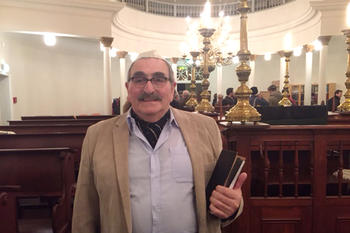What Remains?
Staff members from the Nazi Loot Investigation Bureau (Stabstelle NS-Raub- und Beutegut) were able to establish the owner of a book from the Campus Library.
Oct 09, 2017
Back in the family: In the synagogue of Maastricht, Alexander Ernst Berets was presented with a book that belonged to an uncle who was murdered by the Nazis.
Image Credit: Dimitry Boutylkov
What remains of a person after their death? At times, very little – sometimes only a book that had been in their possession. But Elena Brasiler and Susanne Paul, who work at the University Library’s Nazi Loot Investigation Bureau, are well aware that this can be a lot. Books, after all, are the starting point for their research: In a best case scenario, it may even be possible to identify a books’ rightful owner – or legal heir.
This search helps to reconstruct a piece of the memory of a person who fell victim to National Socialism.
This is how it was in the case of Fritz Berets. A Pentateuch from the year 1914 was found in the Jewish Studies section of Freie Universität’s Campus Library at the end of last year. A handwritten dedication within this book gave the provenance researchers a lead: “Dedicated to Fritz Berets on his Bar Mitzvah, Shabbat Mishpatim on the 1st of Adar Ι, 5679 – February 1, 1919. The fear of the Lord – that is wisdom, and to shun evil is understanding! Job 28: 28 Chief Rabbi, Dr. Levi.” Fritz Berets, born 1906 in Krefeld, was 13-years-old when he was given the Pentateuch – the first five books of the Old Testament (the five books of Moses) – for his Bar Mitzvah.
Fritz Berets was one of ten children. The Berets’ family had immigrated to Germany from the Netherlands and made a name for themselves as merchants in Krefeld. From 1933 onwards, this Jewish family faced prosecution by the Nazi regime. Many family members fled to the Netherlands. Fritz Berets too left Germany for Amsterdam where he met his wife, Lena Strauss from Millingen on the Lower Rhine. She had also fled Germany with her Jewish family.
Fritz Berets’ nephew, the 79-year-old Alexander Ernst Berets, survived the Holocaust. He recalls what his mother said to him: “There was chemistry between the two and they decided to stay together. In Amsterdam they lived in one of the canal houses and they welcomed a set of twins – a boy and a girl. This story could have been taken from the pages of romantic dime novel. Alas, their good fortune didn’t last.”
Following the German occupation of the Netherlands, Fritz Berets and his family were detained, in 1943, at the Westerbork transit camp. From here they were deported – first to Theresienstadt concentration camp and later, in 1944, to Auschwitz. His wife and four-year-old twins were murdered on arrival. Fritz Berets died on March 28, 1945 at Buchenwald/Mittelbau-Dora concentration camp. Only three of his nine siblings survived the Nazi regime.
The Talmud suggests that “A person is forgotten when his name is forgotten.” To prevent Ernst David Berets – one of Fritz Berets’ brothers and Alexander Ernst Berets’ uncle – from being forgotten, a brass plaque “Stolperstein” to commemorate him was installed in Maastricht on October 22, 2013. Freie Universität’s provenance researchers were able to locate Alexander Ernst Berets using this lead. On May 4, 2017, “Struikelsteentjes Maastricht” (Netherlands) staff members were able to present him with his uncle’s Pentateuch at the local synagogue. The staff of the Nazi Loot Investigation Bureau is motivated by Germany’s endorsement of the Washington Principles (1998) and the moral obligation to restitute Nazi-looted cultural property. Above all, however, their work is motivated by the meaning that books have for surviving relatives.
The book that was restituted in Maastricht bears an inscription to a 13-year-old who had his life in front of him. Barely 30 years later, not only was his life extinguished but also the lives of his wife, his children, brothers, and sisters. Not much more than a book is left to remember him by.
This text originally appeared in German in the Tagesspiegel newspaper supplement published by Freie Universität.
Further Information
Nazi Loot Investigation Bureau (Stabsstelle NS-Raub- und Beutegut), University Library, Freie Universität Berlin: http://www.fu-berlin.de/en/sites/ub/ueber-uns/raubgut/index.html
Please address general queries by email to restitution@ub.fu-berlin.de .

